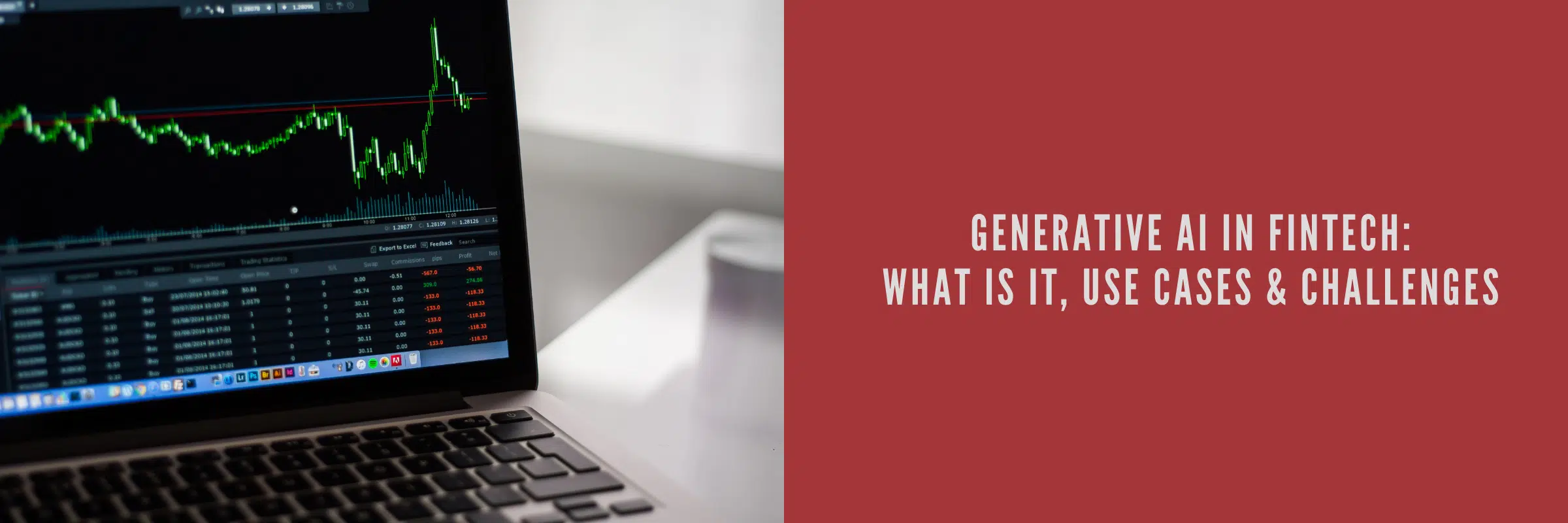
Generative AI in Fintech: What is it, Use Cases & Challenges
Manu Jain | March 1, 2024 , 8 min read
Table Of Content
The emergence of generative artificial intelligence tools has sparked significant interest in the financial services sector. As institutions already involved with established AI products begin exploring the capabilities and vulnerabilities of this new technology, they are finding various applications within their operations.
Banks are utilizing generative AI in specific use cases to enhance internal operations, including fraud detection, code development, customer support, and more. However, challenges exist. For instance, banks are cautious about fully adopting generative AI at scale without clear regulatory guidance. This article will explore the latest use cases and challenges of generative AI in fintech. But before then, let’s understand what generative AI in fintech entails.
What is Generative AI in Fintech?
Generative AI in Fintech refers to the application of artificial intelligence techniques, particularly generative models, to solve problems and enhance processes within the financial services industry.
Generative AI in fintech is like having a team of financial analysts, data scientists, and advisors working tirelessly to analyze market trends, predict stock prices, and develop investment strategies—all in a fraction of the time it would take humans. Imagine a world where your financial decisions are guided by algorithms that sift through vast amounts of data, identifying patterns and opportunities that are invisible to the naked eye.
Advantages of Generative AI in FinTech
1. Better Customer Insights
Generative models can provide valuable insights into customer behavior and preferences by analyzing customer data. A wealth management firm could use generative AI to analyze customer data and generate personalized investment strategies, improving customer satisfaction and loyalty.
2. Automated Trading Strategies
Generative AI can be used to analyze market data and generate trading strategies based on patterns and trends. For example, a hedge fund could use generative AI to develop automated trading strategies that react to market conditions in real-time, leading to potentially higher returns on investments.
3. Personalized Financial Advice
Generative models can generate personalized financial advice and recommendations for individuals based on their financial goals and risk tolerance. Financial institutions could take advantage of a robo-advisor, which could use generative AI to provide personalized investment advice to its clients, helping them achieve their financial goals more effectively.
4. Cost and Time Savings
A bank could use generative AI to automate the process of generating financial reports, freeing up employees to focus on more strategic tasks. This can save time and reduce operational costs.
Generative AI Use Cases in Fintech
Generative AI has several compelling use cases in FinTech, offering innovative solutions and improving operational efficiency. Here are a few examples with relatable real life applications:
1. Credit Risk Assessment
Generative AI can analyze customer data to generate personalized credit risk profiles. For instance, a lending platform could use generative models to assess the creditworthiness of borrowers and offer more tailored loan terms based on their risk profiles.
2. Chatbots
Generative AI can be used to create more human-like chatbots for customer service. An example is a bank using generative models to create a chatbot to engage in more natural conversations with customers and provide personalized assistance.
3. Market Prediction
Predictive models can be generated for forecasting market trends. For instance, an investment firm could use generative models to analyze market data and predict the future performance of different asset classes, helping clients make informed investment decisions.
4. Fraud Detection
Generative models can create synthetic data to train fraud detection algorithms, improving their accuracy. A bank could use generative AI to create realistic synthetic transactions to simulate fraudulent activities, helping to train its fraud detection systems effectively.
5. Algorithmic Trading
Generative AI can analyze historical market data to generate realistic simulations of future market conditions. This can help in developing more accurate trading algorithms. For example, a hedge fund could use generative models to simulate different market scenarios and optimize its trading strategies accordingly.
Challenges of Generative AI in FinTech
While Generative AI offers significant benefits in Fintech, there are several challenges that it can offer:
1. Data Privacy and Security
Generating synthetic data for training models raises concerns about data privacy and security. Using GANs to generate synthetic financial data could potentially lead to the inadvertent creation of sensitive information that could be misused.
2. Model Interpretability
Generative models can be complex and difficult to interpret, making it challenging for financial institutions to understand how decisions are being made. This lack of transparency could lead to regulatory compliance issues.
3. Bias and Fairness
Generative AI models can inherit biases present in the training data, leading to biased outcomes. If historical loan data used to train a model is biased against certain demographics, the model could perpetuate these biases when generating loan approvals.
4. Regulatory Compliance
The use of generative AI in Fintech must comply with regulatory requirements, such as GDPR in Europe or the CCPA in California, which mandate transparency, accountability, and data protection.
Case Study: Generative AI in FinTech
The case studies below demonstrate how fintech companies leverage generative AI to innovate and improve various aspects of their operations, from fraud detection to customer service, ultimately leading to better customer and business outcomes.
1. Capital One
Capital One, a leading financial institution, has been using generative AI to enhance its fraud detection capabilities. Capital One has created synthetic data that closely resembles real transaction data. This synthetic data is then used to train fraud detection algorithms, helping them to identify and prevent fraudulent activities more effectively. This approach has significantly improved fraud detection rates while reducing false positives, ultimately enhancing the security of their customers’ accounts.
2. PayPal
PayPal has also been exploring the use of generative AI in the financial sector. One of the areas where PayPal has applied generative AI is in improving customer service through chatbots. By using generative models to power their chatbots, PayPal has been able to provide more natural and personalized interactions with customers, leading to higher customer satisfaction and retention rates.
Conclusion
The connection between generative AI and fintech is set to grow stronger, as more financial institutions invest in new technologies. This will lead to the widespread use of synthetic financial data, realistic market simulations, and advanced predictive models. These advancements will offer a deeper understanding of financial markets and consumer behaviors.
Those in the financial sector and fintech enthusiasts should keep up with generative AI developments, understanding both its potential and limitations. Collaboration, partnerships with tech companies, and investment in research and development are smart moves to fully exploit the opportunities generative AI provides.
If you are in the fintech space and looking to adopt generative AI into your product, we recommend you schedule a meeting with us to discuss the way forward. For more insights on what we can do for you, here is our case study on the banking, financial service and insurace sector.
Frequently Asked Questions (FAQs)
Q: What are some future trends in the use of Generative AI in FinTech?
Some future trends in the use of Generative AI in FinTech include its application in personalized banking services, fraud prevention using biometric data, and the development of more advanced trading algorithms.
Q: How can fintech companies get started with using Generative AI?
Companies looking to use Generative AI in FinTech can start by identifying specific use cases where Generative AI can add value, such as fraud detection or personalized financial advice. They can then start small with pilot projects to test the technology before scaling up.
Q: What are some key considerations for implementing Generative AI in FinTech?
Some key considerations for implementing Generative AI in FinTech include ensuring data privacy and security, addressing potential bias in the generated data, and providing adequate training for staff on how to use the technology effectively.
Similar Articles Around Generative AI
Related Blogs

Ecommerce Business Intelligence: Why Do You Need It?
Learn everything you need to know about E-commerce business intelligence, what it is, benefits and how to implement it. Read the full article to know more.
Tarsem Singh
Sep 29 ,
19 min read

AI in Customer Service: All You Need To Know
Discover how AI is transforming customer service. Learn about AI applications, benefits, challenges, and future trends that can enhance customer experience.
Manu Jain
Sep 23 ,
16 min read

How AI is Used in Decision Making?
Curious how AI decision making is transforming businesses? Discover how AI is driving smarter, faster, and more accurate choices in today's digital landscape.
Manu Jain
Sep 7 ,
12 min read




